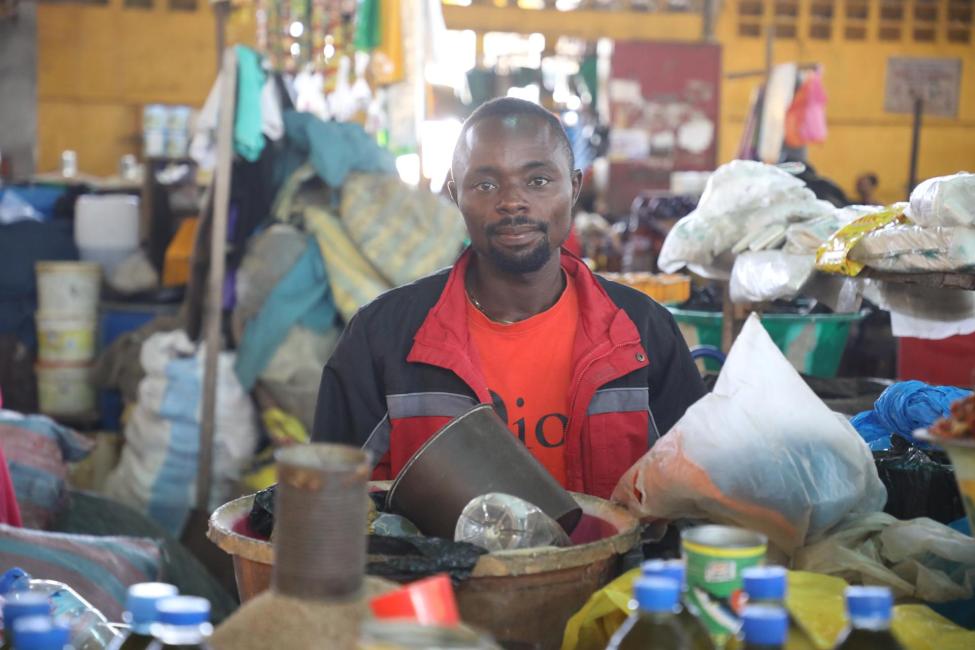-
Who We Are
WHO WE AREThe International Organization for Migration (IOM) is part of the United Nations System as the leading inter-governmental organization promoting since 1951 humane and orderly migration for the benefit of all, with 175 member states and a presence in over 100 countries. IOM has had a presence in Niger since 2016.
About
About
IOM Global
IOM Global
-
Our Work
Our WorkAs the leading inter-governmental organization promoting since 1951 humane and orderly migration, IOM plays a key role to support the achievement of the 2030 Agenda through different areas of intervention that connect both humanitarian assistance and sustainable development.
Cross-cutting (Global)
Cross-cutting (Global)
- Data and Resources
- Take Action
- 2030 Agenda
In the bustling marketplace of downtown Monrovia, the capital of Liberia, there is a small stall that holds big dreams. This is where Lee Roberts, a determined 31-year-old Liberian returnee has turned his life around.
At his market stall, Lee offers a range of goods; from spices to necessary food items and even cosmetics, he has chosen to sell different types of products to meet the various needs of his customers.
As he tends to his stall, Lee’s posture exudes confidence earned through hard work and experience. His interactions with customers reveal a strong connection to his business, an embodiment of his newfound role as an entrepreneur.
Lee’s journey hasn’t been a simple one. He left Liberia in 2017 to seek employment opportunities in Algeria. The road was rocky, marked by uncertain employment, run-ins with abusers, and moments of despair.
In 2021, Lee was arrested due to the lack of an identity document and ended up at the border between Algeria and Niger. He found refuge in the International Organization for Migration (IOM) transit centre in the small and remote town of Assamaka, located in the northern Agadez region. His time in Niger lasted one month. In December 2021, he was assisted to voluntarily return to his home country of Liberia through IOM Niger’s Migrant Resource and Response Mechanism.
Upon return, Lee enthusiastically took part in a vocational training programme focused on enhancing his business skills, which was provided as part of the reintegration support he received from IOM. As part of the reintegration support, he also received food items, including bags of rice, sugar, beans and salt.
Lee is now striving to move on from that challenging chapter through his new business, which holds a lot of promise. He can also count on the support of his family, not only to help him succeed in his business, but also to aid in his social reintegration.
“My family expresses happiness seeing me do well for myself, running a business, and earning a vocational training certificate,” says Lee. “Today, I am able to earn a living all by myself. I initially left Liberia because of the hardship and as I had nothing to do, I thought I should leave, earn money, and return home to my two children,” he adds.
In his journey toward resilience and success, Lee also participated in a psychosocial support session provided by IOM, which helped him address the emotional and psychological challenges he faced during his migration journey. This support was invaluable in boosting his confidence and mental well-being, ultimately contributing to his successful reintegration into his community and business.
Lee often finds himself thinking about all the hardship he’s gone through during his journey. “Now, I find myself grateful for all the little things, like packing up my market stall and heading home after a long day,” he says.
Lee’s community welcomed him back warmly, and his friends and family joined in celebrating his recent achievements. Occasionally, Lee learns that fellow Liberians are contemplating traveling to North Africa to seek greener pasture. He takes it upon himself to inform them about the risks associated with such a journey and the various challenges they might face along the way. He also uses his own business as a success story, showcasing how determination can lead to prosperity in Liberia.
“I don’t think that anything would make me leave Liberia again,” he says with a smile on his face.
Lee’s assisted voluntary return and reintegration were made possible through funding from the Ministry of Foreign Affairs and International Cooperation of Italy, as part of the AVENIR II project titled “Assistance to Vulnerable and Exposed Migrants in Niger – Phase II”.
